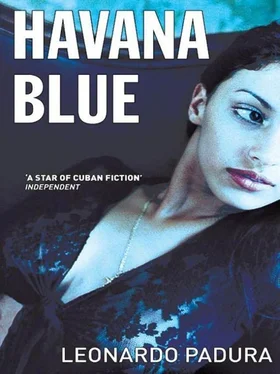“You’ve got to find that bastard even if he’s six feet under,” the Boss grated in his most terrible visceral tone. He hated such situations, felt cheated and annoyed that they only reached him after such dastardly things had been perpetrated. “I’ll call the industry minister. He can sort the business of the money in Spain and give it some thought, because it’s more his problem than ours. But tell me, Mario, why would a man like Rafael Morín do something like that?”
“So visiting time again. I think we should go back to the beginning.”
“But what do you hope I will tell you, Sergeant?” René Maciques responded, looking at the Count as he walked in and sat in a chair by the window. The lieutenant lit a cigarette and exchanged glances with the sergeant. Go on, put the boot in.
“What did you and Morín discuss on the thirty-first?”
“I told you, the usual work-related things, our good financial year-end and the reports we had to file.”
“And you didn’t see him again?”
“No, I left the party shortly before he did.”
“And did you know anything about this fraud?”
“Sergeant, I’ve already told you I didn’t, and could never have imagined anything of the sort. And still can hardly believe it. I don’t know why he would do such a thing.”
“What’s your level of involvement in the matter?”
“Mine? Mine? None whatsoever, Sergeant, I’m a mere office manager who makes no decisions.”
The Count extinguished his cigarette and stood up. He walked over to his desk.
“Your innocence is most moving, Maciques.”
“But the fact is…”
“Don’t strain yourself. Does this remind you of anything?”
The Count took two photocopies from the envelope and put them on his desk, in front of Maciques. The office manager looked at the two policemen, leaned forward and stayed like that for what seemed an eternity: as if he’d suddenly forgotten how to read.
“The lieutenant asked you a question,” said Manolo as he picked up the photocopies. “Does this remind you of anything?”
“Where did you find these papers?”
“As usual, you make it necessary for me to remind you that we are the ones asking the questions… But I’ll give you an answer. They were quite safe and sound in a strongbox in Rafael Morín’s house. What do these documents mean, Maciques?” Manolo repeated, placing himself between the man and the desk.
René Maciques looked up at his interrogator. He was now a perplexed, gloomy old librarian. Sergeant Manuel Palacios took his time. He knew he’d reached a decisive point in the interrogation, when the man under arrest must decide to tell the truth or put his hope in deception. But Maciques didn’t have options.
“It’s one of Rafael’s ruses,” he said nevertheless. “I know nothing about these papers. I’ve never set my eyes on them. You said he did things using my name. Well, here’s another example.”
“So Rafael Morín wanted to put you in a spot of bother?”
“So it seems.”
“Maciques, what might we find in your house if we did a search?”
“In my house… Nothing. The usual. One travels abroad and makes purchases.”
“With what money? Entertainment expenses?”
“I already explained how one can save from the daily allowances.”
“And when you wrap up a big deal, don’t you get a bonus in kind? A car, for example?”
“But I never wrapped up any big deals.”
“Maciques, do you have it in you to kill a man?”
The office manager looked up again, the glint gone from his eyes.
“What are you inferring?”
“Do you or don’t you?”
“Of course I don’t.”
And he kept shaking his head: no, no.
“Why did you go to the enterprise on the thirty-first? And don’t say to switch off the air conditioning.”
“What would you like me to say?”
Then the Count walked back to his desk and stopped next to Maciques.
“Look, Maciques, I’m not as patient as the sergeant. I’m going to tell you straight what I think of you, and I know that one way or the other you’ll end up confessing today, tomorrow or the day after… You’re a piece of shit, as much a thief as your boss, more careful though less powerful. Right now the validity of these papers is being checked in Spain, and perhaps the bank will give us some information, but the car’s a clue that’s much simpler than you think. For some reason I’ve still to fathom, Rafael kept these papers under lock and key, perhaps to protect himself from you, because he knew you were quite capable of putting on his file the allowances he didn’t spend and the expenses he doubled. And Rafael will turn up, I don’t know whether dead or alive, in Spain or Greenland, but he will turn up, and you’ll talk, but even if you don’t, you’re covered in shit, Maciques. Don’t forget it. And to help you think more clearly, you’re going to spend some time on your own. From today you will start a new life at police headquarters… Sergeant, get the papers ready and ask the public prosecutor for an order for the temporary arrest of citizen René. One that can be extended. Be seeing you, Maciques.”
Mario Conde looked at the other laurel trees, the ones very close to the sea that heralded the Paseo del Prado, and repeated his question. A bitter wind blew in from the mouth of the bay forcing him to keep his hands in his pockets, but he needed to think and walk, lose himself in the crowd and hide his Pyrrhic glee and the frustrations of a policeman pleased to strip bare the evil wrought by others. What had led Rafael Morín to do something like that? Why did he want more, still more and more besides? The Count contemplated the Palace of Matrimony and the shiny black ’57 Chrysler decked out in balloons and flowers waiting for the nuptial descent of the over-forties who still had it in them and still smiled for the inevitable photo at the top of the steps. He observed the ones with staying power defying the cold in the queue at the pizzeria on Prado and saw the notices, stapled to the trunk of a laurel tree, of those who needed to move. They made honest and dishonest proposals but just needed a few square feet of ceiling where they could live. He watched two dead-set, unconnected homosexuals walk by shivering with cold; their well-intentioned, ingenuous eyes looked him up and down. He spotted a peaceful mulatto, leaning against a streetlamp, looking like a lethargic Rastafarian, his perfect dreadlocks tucked under his black beret, perhaps waiting for the first foreigner to step up so he could suggest five pesos for one dollar, Mister, seven for one, bro’, and I’ve got grass, anything to get through the doors to the forbidden world of abundance armed with a passport. He switched to the lamppost on the pavement opposite: a blonde in incredibly lascivious make-up was dying of cold, though she promised to be hot, even if it snowed, with a mouth made for a blowjob; the blonde for whom a nationally produced mortal like Mario Conde was worth less than a drunk’s spittle and who wanted dollars like her friend the Rasta mulatto and would suggest thirty for one: her youthful sex, perfumed, well-trained and guaranteed against rabies and other sickness, in exchange for the dollars she yearned after; the blowjob came extra, natch. He watched a kid skating jump onto a wooden box and skate off into the dark. He reached the Parque Central and almost decided to get entangled in the eternal arguments over baseball that raged there daily, whatever the temperature, to find a reason for yet another defeat for those bastard Industriales; balls, balls is what they’re lacking, he’d have shouted in honour of Skinny, who was neither skinny nor nimble enough to be shouting on his own behalf. He contemplated the lights in the Hotel Inglaterra, the shadows surrounding the Teatro García Lorca, the queue in front of the Payret cinema, the dismal drab entrance to the Asturian Centre and the aggressive dilapidated ugliness of the Gómez edifice. He felt the irrepressible beat of a city that he tried to make a better place and thought of Tamara: she was expecting him and he was on his way, perhaps to ask her the same question, and nothing else.
Читать дальше











